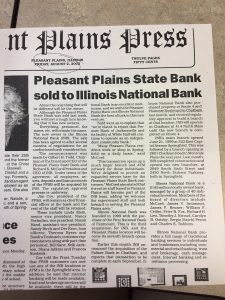 Corn. Soybeans. Tractors and combines. They’re the things that make up many small farming communities in Central Illinois, and Pleasant Plains is no exception. So it didn’t surprise any of us that a banker would want to ride a combine even though she has no farming background. Her motto: When in Pleasant Plains, do as the Pleasant Plains folks do.
Corn. Soybeans. Tractors and combines. They’re the things that make up many small farming communities in Central Illinois, and Pleasant Plains is no exception. So it didn’t surprise any of us that a banker would want to ride a combine even though she has no farming background. Her motto: When in Pleasant Plains, do as the Pleasant Plains folks do.
Today, Marsha Shomidie still marvels at how farmers can create such neat, perfect rows. Or as she puts it, “How do they stay between those lines?”
Farming and banking actually go hand in hand in Plains. There’s been a bank there since the late 1800’s, always ready to serve the local community.
Glen Brandt and his sister, Evelyn Thomas Brandt, have banking roots that go back to the 1940s when they opened their own bank accounts at Pleasant Plains State Bank. All grown up and with a business to run, they used the local bank to handle Brandt’s business transactions. Evelyn walked in the doors of the bank on 106 E. Main every day. In an interview with the State Journal-Register, she said of the early days of Brandt Consolidated, “I was the one that went to the bank to borrow money and saw that bills were paid.” In those days, each transaction was recorded by hand on a ledger.
In the early 1990s, Glen and Evelyn had the opportunity to own shares in the local bank. With the bank’s charter in Pleasant Plains, all was good. In 1995, Pleasant Plains State Bank became part of an investment company that also established a bank in Jacksonville. Within a few years, some board members voted to move the bank charter to Jacksonville. Plains’ citizens feared this could be the end of banking in their community.
Glen said, “We knew we needed to make banking a pleasure again for our community.” So when they had the opportunity to move the Pleasant Plains branch to INB, Glen was fully supportive.
Moving to INB wasn’t a huge stretch, said Jim Coy, president of Pleasant Plains State Bank. “We’d done business with INB. They actually provided some products to our customers that we couldn’t provide on our own through a ‘correspondent arrangement.’” Both banks also used the same back-end technology, making the move almost transparent except for the name change.
“Also,” Jim continued, “INB’s emphasis is on the customer. That made them a good fit.” He went on to add, “People want to do financial dealings with people they trust.” The local staff trusted INB, so the community easily followed.
Jim said INB’s concerns about the community also boded well. When Jim was ready to transition to retirement, Marsha stepped into the job. Her kids went to school in Plains. She knew everybody in town. And, today, she puts her full support around community activities. “We run the Angel Tree each Christmas out of the bank,” she said. “Our lobby and spare office will be brimming with kids come mid December.” INB also supports the local schools and Plains’ shining jewel, historic Clayville.
The move from a small-town community bank to a community-focused larger bank meant good things for banking services in Pleasant Plains. Glen summed it up like this: “Moving to INB got us so much. We have more up-to-date services like on-line banking . . . And now our farmers can get a credit line from the bank right here in town.”
You’ll still find INB in the location of the original Pleasant Plains bank built before the turn of the 20th Century. That original footprint has been expanded to take up the space of four long-gone businesses which were, at one point in their histories, a barber shop, grocery store and law office. The second floor of the bank building was even once used for dances!
This second-floor dance floor is now storage. Walls between the original bank and former businesses came down over the years to accommodate the Pleasant Plains bank building, but you can still see some of the original exterior, brick walls in staff offices. The newest part of the bank was built in the 1970s to accommodate the present-day teller line and, more importantly, drive-up window.
Evelyn looks back on the changes and said she has no qualms turning the bank over to “younger people.” She added, “That’s progress. That’s what’s supposed to happen.”